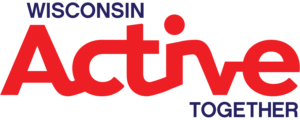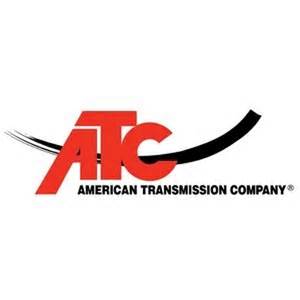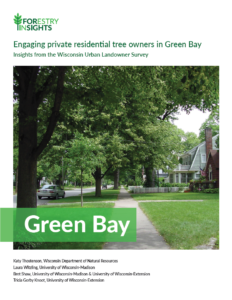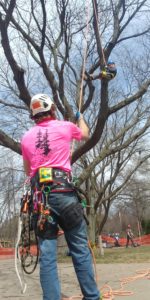Four Wisconsin regional planning commissions (RPC), Bay-Lake RPC, East Central Wisconsin RPC, Northwest Wisconsin RPC, and Southeastern Wisconsin RPC, and the Wisconsin Department of Natural Resources (DNR) have jointly awarded a total $122,200 to communities under their 2018 Wisconsin RPCs and DNR Great Lakes Basin Tree Planting Grant Program. The DNR marketed the grant opportunity, provided process guidance and assistance ranking the grants. Eighteen Wisconsin communities will receive funds for projects to reduce runoff and mitigate the impacts of Emerald Ash Borer (EAB). Continue reading “Bay-Lake RPC announces the award of 18 tree planting grants”
Urban Forestry News
Wisconsin Urban Forestry Council announces new members
The Wisconsin Urban Forestry Council is pleased to announce the addition of three new members to the group. We are especially pleased to have increased our geographic and professional diversity and look forward to working with them on issues related to Wisconsin’s urban and community forests. Continue reading “Wisconsin Urban Forestry Council announces new members”
Unique project: DeForest using thermally modified ash from their parks, for their parks
In the wave of EAB and amid some park reconstruction projects, the folks in the village of DeForest thought, “why don’t we put some of these trees to work for us.” After decades of providing shade and shelter, several large ash trees came down in Fireman’s Park. Park staff thought it would be fitting to reuse what they could from these stately trees whose fate had been sealed by EAB, which was confirmed in DeForest in 2015. Continue reading “Unique project: DeForest using thermally modified ash from their parks, for their parks”
Getting active in Wisconsin’s urban forest
 By Rob Fontella, fontella@wisc.edu, healthTIDE UW-Madison Public Health
By Rob Fontella, fontella@wisc.edu, healthTIDE UW-Madison Public Health
As the weather gets warmer, Wisconsinites are getting out there and enjoying their community and the natural areas the state has to offer. Recently a new effort was launched to encourage communities in Wisconsin to become part of a campaign recognizing the community’s efforts to promote active lifestyles. Continue reading “Getting active in Wisconsin’s urban forest”
New funding opportunity with American Transmission Company
 American Transmission Co (ATC) has new program that provide funding for the purchase of seeds, plugs or plants that are low-growing perennials that can be planted within a transmission line right-of-way. This program in conjunctions with the ATC’s existing Community Planting Program will help create greener communities. Learn more about both programs through the press release from ATC.
American Transmission Co (ATC) has new program that provide funding for the purchase of seeds, plugs or plants that are low-growing perennials that can be planted within a transmission line right-of-way. This program in conjunctions with the ATC’s existing Community Planting Program will help create greener communities. Learn more about both programs through the press release from ATC.
Continue reading “New funding opportunity with American Transmission Company”
Finding bird friendly trees
If you are looking for bird friendly trees and shrubs a database has been created that can help. The Audubon Native Plants Database allows you to enter a zip code and get a list of bird friendly native plants. You can filter based on plant type and what type of bird the plant attracts. The database also shows what kind of birds favor particular plants.
Urban Forestry Grants application and guidance open for review
By Alex Elias, Urban Forestry Grants Manager
Updated guidance for the Urban Forestry Grants program has been posted for public input and will be available for a 21-day comment period. Guidance is available for both internal and external review from Tuesday, May 15, 2018 through Monday, June 4, 2018 on the proposed program guidance open for public comment website. Continue reading “Urban Forestry Grants application and guidance open for review”
Insights from the Wisconsin Urban Landowner Survey inform tree care outreach
By: Katy Thostenson, DNR social science analyst (Madison), kathryn.thostenson@wisconsin.gov, 608-535-7049
 Homeowners in Wisconsin feel the top 5 most important benefits provided by the trees in their yard are:
Homeowners in Wisconsin feel the top 5 most important benefits provided by the trees in their yard are:
1) Beauty
2) Shade and cooling
3) Improved air quality
4) Privacy, and
5) Making their neighborhood a better place to live
This list of homeowners’ perceived benefits from their trees is just one valuable insight gathered from the 2017 Wisconsin Urban Landowner Survey. More than 1,700 landowners responded to the survey from Green Bay, Madison, Milwaukee and Wausau, providing insights about their attitudes around tree care, their concerns about tree risks, and their tree care behaviors such as pruning and planting. Continue reading “Insights from the Wisconsin Urban Landowner Survey inform tree care outreach”
Urban Forestry Consultant Directory – Annual update request
For many years the Urban and Community Forestry Program has maintained the Urban Forestry Consultants Directory, a document containing contact information and services provided by consultants who have made themselves known to DNR. Each May, we ask those listed to review their information and submit any necessary updates. We also welcome new submittals at this time, and throughout the year! Continue reading “Urban Forestry Consultant Directory – Annual update request”
Celebrate Arbor Day: Successes across the state

Kids climb at Henry Vilas Zoo in Madison
Like a child grows from birth to toddler to adulthood, a tree grows from seed to sapling to mature tree. As we nurture and care for our children as they grow, we must also for trees. This year there were several Arbor Day celebrations hosted across the state, all aiming to increase the publics knowledge of how to cherish and cultivate trees. Continue reading “Celebrate Arbor Day: Successes across the state”
